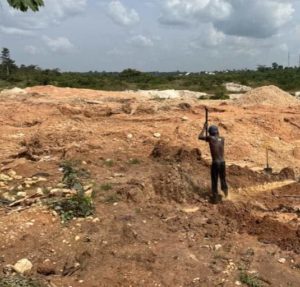
Share this
Man, 80, warns against bribery and galamsey’ amid curses.
In a poignant statement that resonates deeply within the context of Ghana’s ongoing struggle with illegal mining—known locally as “galamsey”—an 85-year-old elder, Paul Manu from Gomoa Odoben in the Central Region, has admonished fellow Ghanaians that God will curse anyone who accepts bribes and allows these unauthorized mining practices to continue.
His remarks ignite a critical discourse on corruption, environmental degradation, and the moral obligations of the nation’s leader
Galamsey has gained significant notoriety in recent years as it poses jeopardizing threats to Ghana’s environment, economy, and public health.
Characterized by the unregulated extraction of minerals, galamsey has burgeoned in response to the increasing demand for gold.

While this activity contributes to local economies and provides livelihoods for many, its consequences are dire: deforestation, water pollution, and land degradation severely undermine communities’ futures.
Despite numerous government crackdowns and public outcry, illegal mining persists, prompting many citizens to question the commitment of their leaders to end the scourge.
Mr. Paul Manu, speaking from a rich well of experience and wisdom, indicates that this failure primarily to greed and selfishness among those in leadership positions.
Manu’s assertion underscores a troubling reality: many leaders, whose duty it is to protect the country’s resources and ensure the well-being of its citizens, are often swayed by illicit financial gains that come from turning a blind eye to galamsey operations.
Mr. Paul Manu, speaking from a rich well of experience and wisdom, indicates that this failure primarily to greed and selfishness among those in leadership positions.
Manu’s assertion underscores a troubling reality: many leaders, whose duty it is to protect the country’s resources and ensure the well-being of its citizens, are often swayed by illicit financial gains that come from turning a blind eye to galamsey operations.
The phenomenon of accepting bribes in exchange for turning a blind eye to illegal mining activities reflects a pervasive culture of corruption that undermines Ghana’s development.
In a landscape where natural resources are plentiful, the struggle with greed has become a formidable barrier to sustainable economic growth. Instead of prioritizing the nation’s long-term health and prosperity, some opt for short-term gain, enriching themselves while jeopardizing the ecological legacy of future generations.
For Manu, in an interview, the implications of these actions extend beyond earthly consequences; he perceives a moral and spiritual reckoning embedded within the fabric of such choices.
His claim that God will curse those who accept bribes serves as a reminder of the ethical responsibilities held by individuals, particularly those in positions of authority.
His words evoke a call for accountability and integrity—a plea for citizens and leaders alike to recognize and rectify the grievances that corruption and environmental degradation inflict on society.




